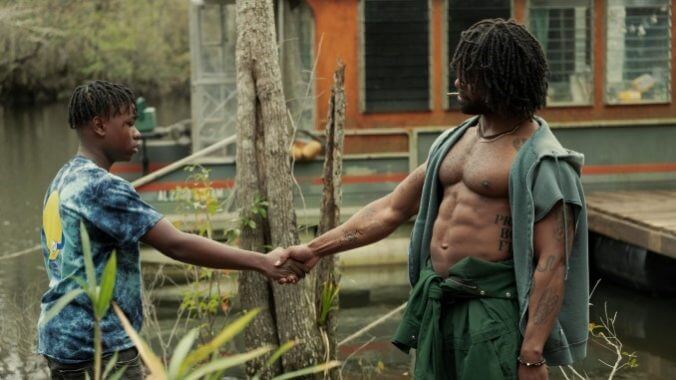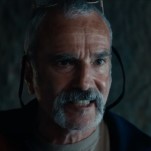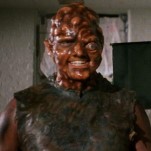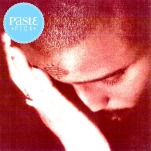Bruiser‘s Modern Black American Tragedy Leaves a Mark

Two sins weigh heavily on Miles Warren’s Bruiser: The broader movie industry’s enduring ignorance of Trevante Rhodes’ galactic star power, and streaming culture’s capacity for muffling new talent. Rhodes’ screen radiance can’t help shining no matter what he’s in, or how long he’s actually in it. (See Gerard McMurray’s Burning Sands.) In Warren, he’s found a director capable of harnessing his charisma, but in Hulu he’s found a platform too small for the scope of Warren’s feature debut, made with such assurance that it scarcely reads as such.
Plenty of directors go half of their careers or longer without making a movie that lands as hard as Bruiser, either emotionally or aesthetically. It’s a sign of Warren’s potential that this is his first picture out the gate, and that his understanding of Rhodes’ persona is matched only by Barry Jenkins, whose Moonlight would make a fine double feature with Bruiser; they’re both movies about dads in disarray, masculinity in crisis, and a Black teen under strain from wanting resolution in the former while struggling with the latter. Bruiser, however, feels like it could only have been made this far into Rhodes’ career, with seven years of growth and experience in his rearview—perfect for playing a character stitched together from guilt and longing.
Rhodes plays Porter, one of Bruiser’s two father figures, a drifter holed up in a houseboat who takes 14-year-old Darious (Jalyn Hall) under his wing after the kid gets in a scrap with a supposed friend. Stress is Porter’s oxygen, but he breathes out cool. Darious is captivated by Porter: His easygoing philosophy, his gentle demeanor, his shaggy dreadlocks, his Vanson motorcycle jacket, emblazoned with the human skeletal system. He cuts a sharp contrast to Malcolm (Shamier Anderson), Darious’ dad, who’s like a grizzly bear stuffed into khakis. Malcolm is strict. He’s square. He loves Darious, but like far too many men raising sons, his listening skills are virtually nil, which makes Porter an even more appealing alternative.
The movie gives Darious the uncomfortable task of choosing whose example to follow, with his mother, Monica (Shinelle Azoroh), shunted off to the sidelines; contemporary culture criticism’s enforced virtue demands Bruiser be held accountable for failing to spare her more screentime, but frankly, Monica’s role in the story reflects her likely role in a real-life version of this same scenario. Machismo is exclusive. It pushes women out of conversations, especially when the stakes involve male identity and are thus high. Monica tries to intervene as a tempering force between Darious, Malcolm, and Porter, but she’s overpowered by their combined testosterone levels. Darious is just a boy; self-control isn’t his strong suit. Malcolm and Porter are adults, but they’re wrestling with their own inner boys, and, as it turns out, their shared past. Put bluntly, Monica is out of her depth, which is the worst place a mother can be in when trying to save her baby’s soul.
-

-

-

-

-

-

-

-

-

-

-

-

-

-

-

-

-

-

-

-

-

-

-

-

-

-

-

-

-

-

-

-

-

-

-

-

-

-

-

-








































